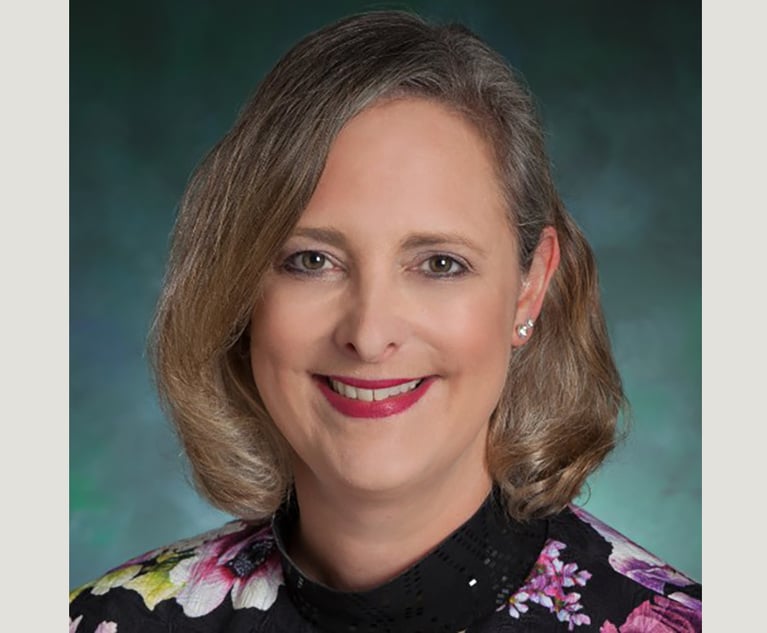The Citizen Advocacy Center promotes participation
The organization encourages civic engagement through education and policy-making efforts
December 20, 2012 at 07:00 PM
3 minute read
This month, Inauguration Day will end a presidential election that kept politics on the country's collective mind for months. But for the community lawyers at the nonprofit Citizen Advocacy Center (CAC) in Elmhurst, Ill., government—and its impact on peoples' lives—isn't just an election-year concern.
Founded in 1994 by attorney Theresa Amato, the CAC provides pro bono legal services to individuals trying to learn more about government processes, exercise their legal rights to civic participation or effect policy change.
“You know the adage, 'You can't fight City Hall?' Well, the center helps people not only understand how to fight City Hall, but how to win,” says Terry Pastika, the CAC's executive director and one of its community lawyers.
It accomplishes this in four ways: by training and educating the public, students and journalists about laws and tools that facilitate civic participation; providing resources to those groups; monitoring government agencies for abuses of power; and pushing for policies that promote government transparency, accessibility and accountability.
On the first of these fronts—education—the CAC has assembled a library of free civic lesson plans on its website, and it also works with high school and middle school teachers to integrate more holistic civic education into their curricula. “The idea is that rote memorization of the three branches of government and what they do really is not very meaningful if you don't know where City Hall is or what happens inside,” Pastika says.
When it comes to enacting local and statewide policy change, the CAC staff takes on projects that involve systemic issues in which a favorable outcome could lower barriers to democratic participation. For instance, the center was a member of Illinois Attorney General Lisa Madigan's task force charged with rewriting Illinois' Freedom of Information Act. In that case, Pastika says, the CAC's local expertise helped it to make a broader, statewide impact.
“We were able to substantively contribute to that task force because we could say, 'In XYZ community, we've seen these kinds of abuses of power,' and we could put a name to the face in a specific community,” she says.
The CAC accomplishes its work with the help of three staff members and donations from private foundations and individuals. It also benefits from a vibrant internship and volunteer program that includes high schoolers, law students, attorneys and others.
According to Pastika, one of the CAC's greatest strengths is that it allows individuals who seek the center's help on a specific issue to gain a greater appreciation of the overall democratic process, such as one client who was initially interested in an issue on the municipal level.
“Now she's more involved than ever before,” Pastika says. “When she reads the paper, she's more critical in how she consumes news. When there's talk about campaign finance reform, redistricting, she understands how those issues affect her dinner table issues. And that's a success for the center. Because we help that person address her issue, but in doing so, we've broadened and deepened the scope of her civic engagement.”
This content has been archived. It is available through our partners, LexisNexis® and Bloomberg Law.
To view this content, please continue to their sites.
Not a Lexis Subscriber?
Subscribe Now
Not a Bloomberg Law Subscriber?
Subscribe Now
NOT FOR REPRINT
© 2025 ALM Global, LLC, All Rights Reserved. Request academic re-use from www.copyright.com. All other uses, submit a request to [email protected]. For more information visit Asset & Logo Licensing.
You Might Like
View All
Global Software Firm Trying to Jump-Start Growth Hands CLO Post to 3-Time Legal Chief

In-House Legal Network The L Suite Acquires Legal E-Learning Platform Luminate+

John Deere Annual Meeting Offers Peek Into DEI Strife That Looms for Companies Nationwide
7 minute read
Antitrust in Trump 2.0: Expect Gap Filling from State Attorneys General
6 minute readTrending Stories
Who Got The Work
J. Brugh Lower of Gibbons has entered an appearance for industrial equipment supplier Devco Corporation in a pending trademark infringement lawsuit. The suit, accusing the defendant of selling knock-off Graco products, was filed Dec. 18 in New Jersey District Court by Rivkin Radler on behalf of Graco Inc. and Graco Minnesota. The case, assigned to U.S. District Judge Zahid N. Quraishi, is 3:24-cv-11294, Graco Inc. et al v. Devco Corporation.
Who Got The Work
Rebecca Maller-Stein and Kent A. Yalowitz of Arnold & Porter Kaye Scholer have entered their appearances for Hanaco Venture Capital and its executives, Lior Prosor and David Frankel, in a pending securities lawsuit. The action, filed on Dec. 24 in New York Southern District Court by Zell, Aron & Co. on behalf of Goldeneye Advisors, accuses the defendants of negligently and fraudulently managing the plaintiff's $1 million investment. The case, assigned to U.S. District Judge Vernon S. Broderick, is 1:24-cv-09918, Goldeneye Advisors, LLC v. Hanaco Venture Capital, Ltd. et al.
Who Got The Work
Attorneys from A&O Shearman has stepped in as defense counsel for Toronto-Dominion Bank and other defendants in a pending securities class action. The suit, filed Dec. 11 in New York Southern District Court by Bleichmar Fonti & Auld, accuses the defendants of concealing the bank's 'pervasive' deficiencies in regards to its compliance with the Bank Secrecy Act and the quality of its anti-money laundering controls. The case, assigned to U.S. District Judge Arun Subramanian, is 1:24-cv-09445, Gonzalez v. The Toronto-Dominion Bank et al.
Who Got The Work
Crown Castle International, a Pennsylvania company providing shared communications infrastructure, has turned to Luke D. Wolf of Gordon Rees Scully Mansukhani to fend off a pending breach-of-contract lawsuit. The court action, filed Nov. 25 in Michigan Eastern District Court by Hooper Hathaway PC on behalf of The Town Residences LLC, accuses Crown Castle of failing to transfer approximately $30,000 in utility payments from T-Mobile in breach of a roof-top lease and assignment agreement. The case, assigned to U.S. District Judge Susan K. Declercq, is 2:24-cv-13131, The Town Residences LLC v. T-Mobile US, Inc. et al.
Who Got The Work
Wilfred P. Coronato and Daniel M. Schwartz of McCarter & English have stepped in as defense counsel to Electrolux Home Products Inc. in a pending product liability lawsuit. The court action, filed Nov. 26 in New York Eastern District Court by Poulos Lopiccolo PC and Nagel Rice LLP on behalf of David Stern, alleges that the defendant's refrigerators’ drawers and shelving repeatedly break and fall apart within months after purchase. The case, assigned to U.S. District Judge Joan M. Azrack, is 2:24-cv-08204, Stern v. Electrolux Home Products, Inc.
Featured Firms
Law Offices of Gary Martin Hays & Associates, P.C.
(470) 294-1674
Law Offices of Mark E. Salomone
(857) 444-6468
Smith & Hassler
(713) 739-1250






